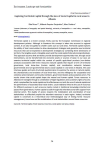Muco E., Requier-Desjardins M., Dedeire M. (2023). Exploring territorial capital through the lens of social capital in rural areas in Albania. In : Laranjo M. (ed.), Alexandre A. (ed.), Medronho B. (ed.), Eufrázio S. (ed.), Marques C. (ed.), Pinto Correia T. (ed.). VIII PhD students meeting in environment and agriculture: book of abstracts.
Évora (Portugal) : Universidade de Évora.
p. 26.
8. PhD Students Meeting in Environment and Agriculture, 2023/12/11-12, Évora (Portugal). Oral Communication 7.
https://www.med.uevora.pt/wp-content/uploads/2024/01/Book-of-Abstracts_VIII-EEDAA_2023_ISBN.pdf
https://www.med.uevora.pt/wp-content/uploads/2024/01/Book-of-Abstracts_VIII-EEDAA_2023_ISBN.pdf
| Titre : | Exploring territorial capital through the lens of social capital in rural areas in Albania |
| in : | |
| Auteurs : | E. Muco ; M. Requier-Desjardins ; M. Dedeire |
| Type de document : | Communication à un Congrès (avec Actes) |
| Editeur : | Évora [Portugal] : Universidade de Évora, 2023 |
| Format : | p. 26 |
| Note générale : | Oral Communication 7 |
| Langues : | Anglais |
| Langues du résumé : | Anglais |
| Catégories : |
Catégories principales 04 - DEVELOPPEMENT LOCAL ET REGIONAL ; 4.1 - Territoire (généralités). Economie Régionale et Spatiale. Aménagement du TerritoireThésaurus IAMM CAPITAL TERRITORIAL ; CAPITAL SOCIAL ; ZONE RURALE ; DEVELOPPEMENT REGIONAL ; COMMUNAUTE RURALE ; STRATEGIE DE DEVELOPPEMENT ; RESSOURCE TERRITORIALE ; PRODUIT FORESTIER NON LIGNEUX ; RESSOURCE FORESTIERE ; ALBANIE |
| Résumé : | Territorial capital is a recent concept, firstly used by the European Commission in regional development policies. Although in literature this concept is taken into account in regional context, it can also be applied to smaller scales such as rural areas. Territorial capital explores the ability of local communities to draw development strategies and generate new territorial resources that can be exploited in development strategies by combining three dimensions of territory: the tangible assets, intangible assets and the social capital fostered among individuals. This approach assumes that territories provide development opportunities that, through social interventions, can be transformed into economic assets or sources of value. In our case, we examine territorial capital within the context of specific agricultural products (non-timber products) associated with forest resources (natural capital) that require a form of territorial governance, local know-how (human capital), and coordination networks between governmental and non-governmental actors (social capital) in rural areas in Albania. We used interview guides and semi-structured questionnaires to examine the access on natural capital, the characteristics and evolution of local know-how, and the willingness for cooperation and collective action between community members, government bodies and associative actors. The results shown that social capital shape the natural and human capital. Forest resources in Albania are managed through a combination of legal regulations and customary rights of access which complexifies the social capital and its effectiveness on both the use of natural capital and the performance of associated local value chains. Local traditions linked to the use of resources for different purposes in each area are mainly rooted in traditional knowledge inherited and passed from generations. Human capital is built through this inheritance and with support from external actors. The duality of access requires the mobilization and coordination of local stakeholders to effectively exploit the abundant resources in each region. Indeed, territorial capital is conceived as a theoretical and methodological way of linking forest resource management, know-how and the mobilization of local stakeholders around these resources. |
| Cote : | Online |
| URL / DOI : | https://www.med.uevora.pt/wp-content/uploads/2024/01/Book-of-Abstracts_VIII-EEDAA_2023_ISBN.pdf |
Documents numériques (1)
PRO51202.pdf Adobe Acrobat PDF |







